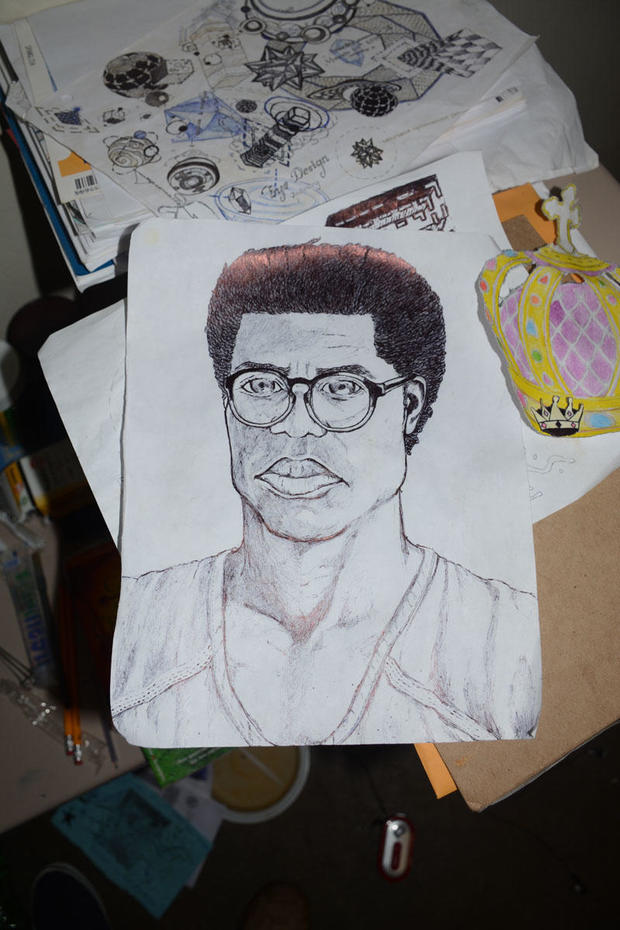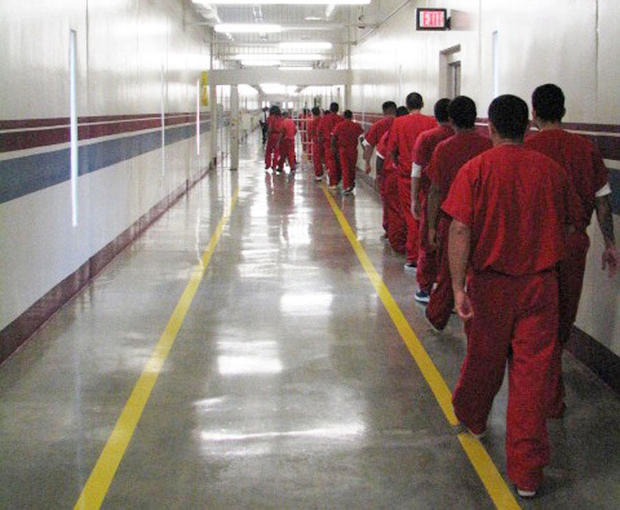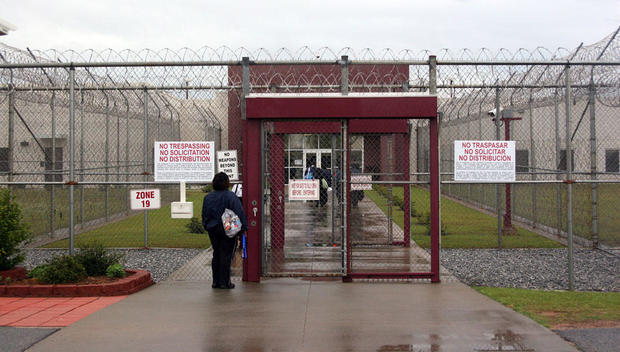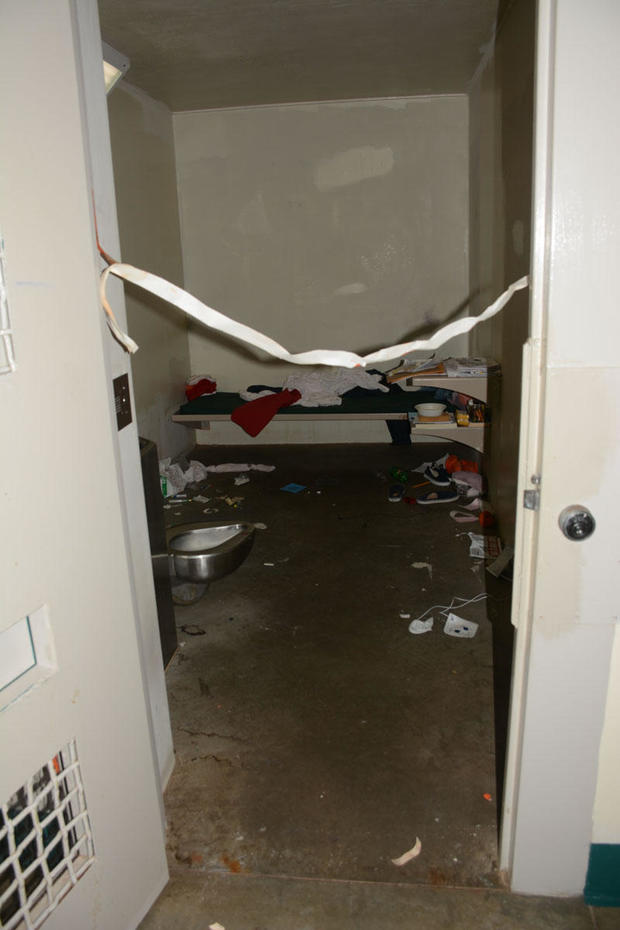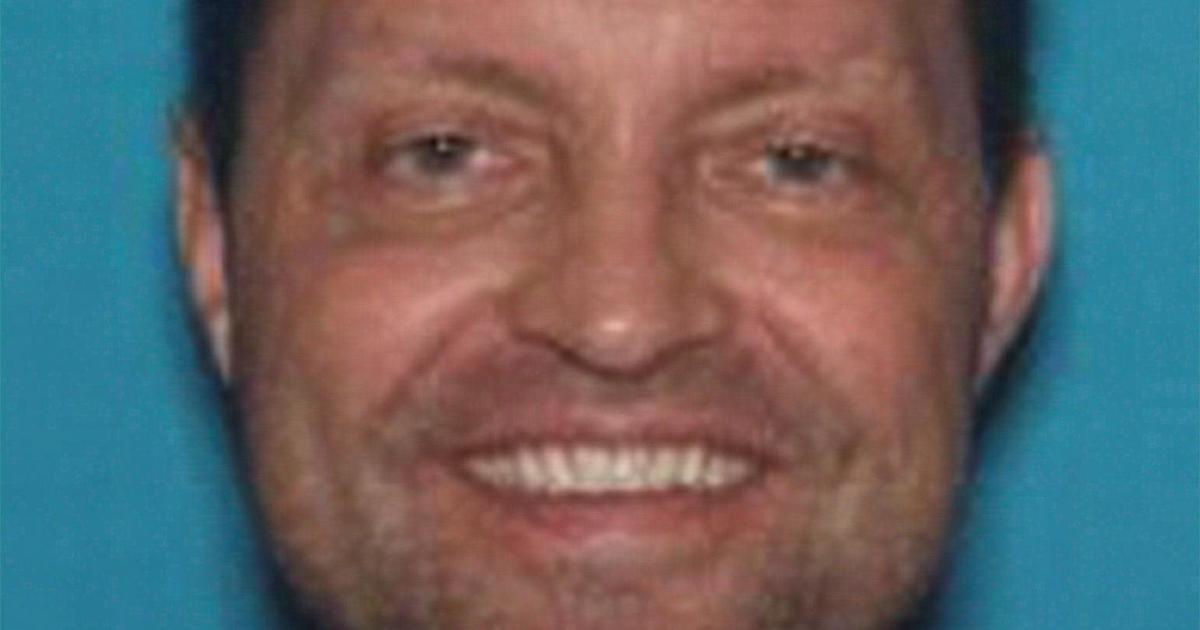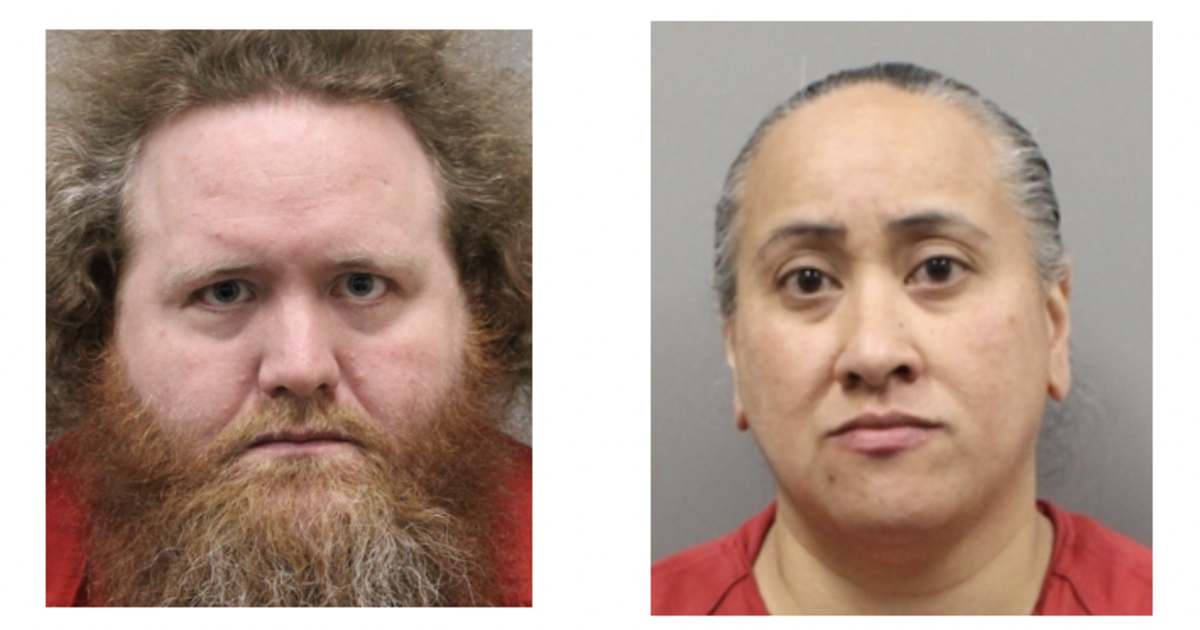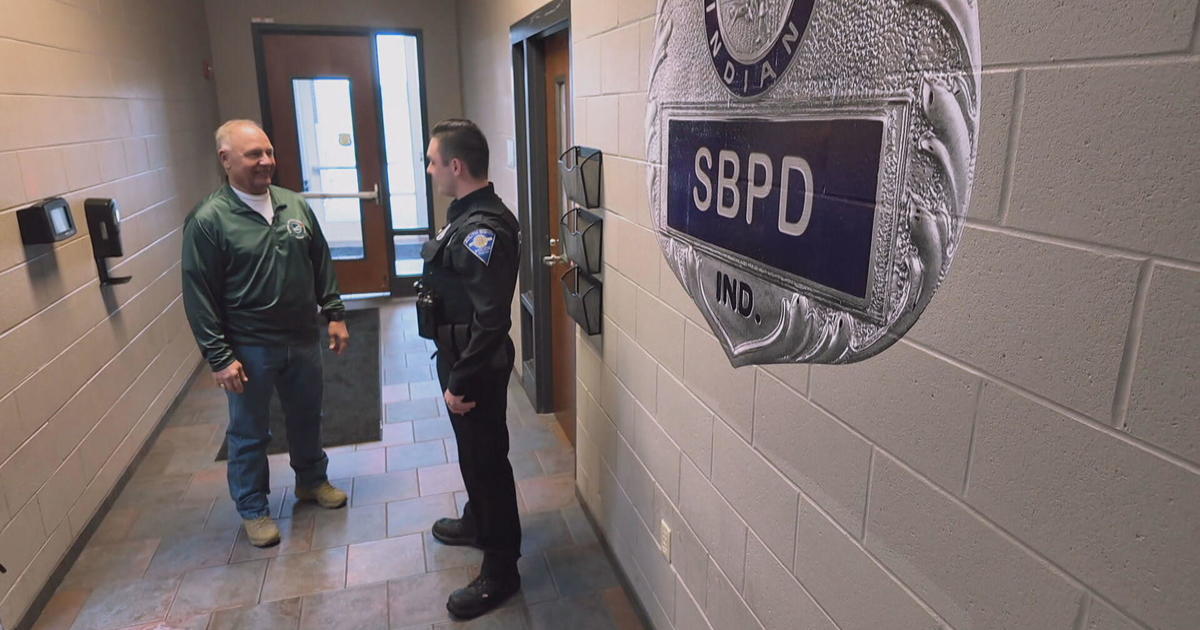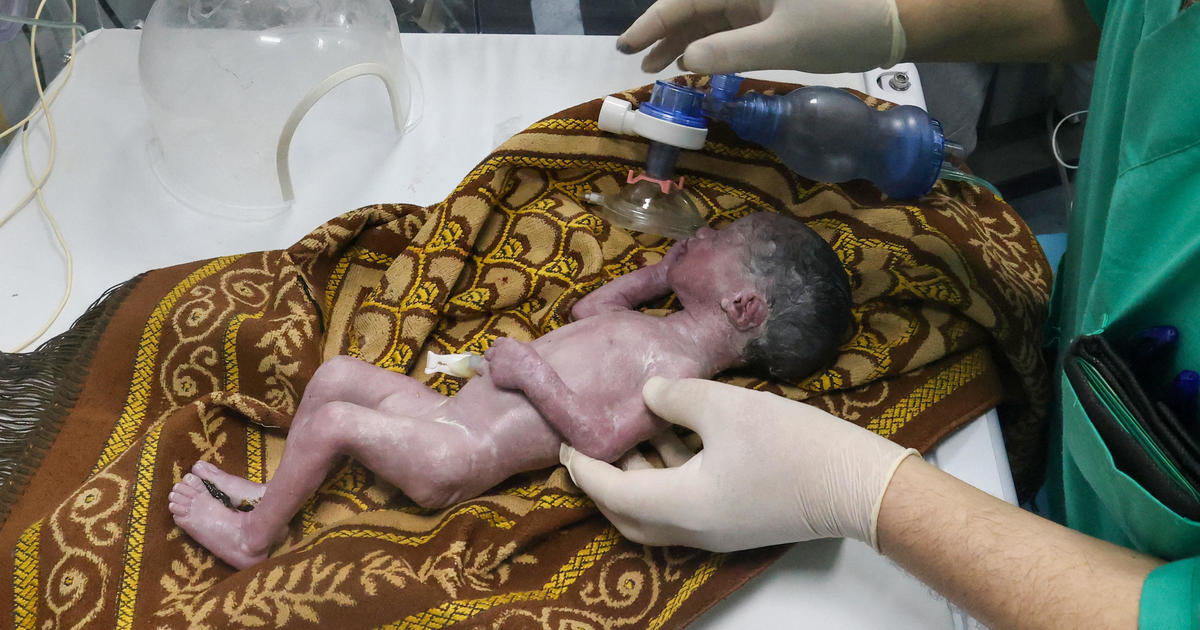ICE review found failures in care of mentally ill detainee who died by suicide
Staff at an immigration detention center in Georgia didn't follow numerous regulations in the case of a detainee who killed himself in 2017, according to an internal ICE review obtained by CBS News.
The document, known as a "detainee death review," found staff at the agency's Stewart Detention Center in Lumpkin, Georgia, didn't refer Jean Carlos Jimenez-Joseph for an "urgent mental health assessment," even after he reported auditory hallucinations and told staff he was trying to kill himself when he jumped from a second-tier balcony. Jimenez-Joseph was held in solitary confinement for 18 days in the custody of Immigration and Customs Enforcement, where he ultimately hanged himself.
The treatment of the 27-year-old Panamanian man while in ICE custody has drawn outrage from immigrant rights advocates concerned over the agency's treatment of mentally ill detainees, particularly the use of "segregation," when detainees are isolated in a small cell for disciplinary or other "administrative" reasons.
The United Nations Special Rapporteur on Torture has said solitary confinement should be banned in most cases, and likened it to torture for juveniles, people with mental illness or disabilities, or when used for prolonged periods of more than 15 days.
While the events surrounding Jimenez-Joseph's suicide were outlined by the Georgia Bureau of Investigation and have been widely reported, the detainee death review, obtained via a Freedom of Information Act request by CBS News, has not been previously seen.
It shows the results of a three-day review in June 2017 by a unit within ICE's Office of Professional Responsibility that investigates detainee deaths.
The report stops short of calling into question the decision to place Jimenez-Joseph in solitary confinement. But it found 11 instances of "deficiencies" in Stewart's compliance with 10 of ICE's performance-based national detention standards. In addition, it identified 22 "areas of concern" that included eight violations of the facility's rules.
Staffing and medical care questioned
One of the agency's standards requires that ICE detainees must be provided with "medically necessary and appropriate" medical, dental, mental health care and pharmaceutical needs. But the review found staff members failed to meet that standard when they postponed by a month a psychiatric evaluation of Jimenez-Joseph's five requests to increase his medication dosage because he was hearing voices.
The "areas of concern" included a year-long vacancy for a full-time psychiatrist position that caused a two- to three-month backlog in teleconference appointments with an offsite psychiatrist. It also found only one of three onsite mental health provider positions was filled at Stewart during the last weeks of Jimenez-Joseph's detention. Ultimately, Jimenez-Joseph never spoke with a psychiatrist about increasing his medication; his suicide occurred the day his appointment was scheduled, the review found.
"Nearly all of the guardrails that were put in place institutionally and organizationally to prevent tragedies like this from happening were ignored, and ultimately that led to Jean's death," said R. Andrew Free, a lawyer who is suing ICE on behalf of Jimenez-Joseph's family.
Jimenez-Joseph came to the U.S. as a child and was granted Deferred Action for Childhood Arrivals (DACA) status in 2016. He had several encounters with police and immigration authorities in North Carolina beginning that year for offenses including larceny and assault, but wasn't flagged for deportation until after he was arrested on a misdemeanor warrant in February 2017. He was taken into ICE custody and transferred to Stewart on March 7, 2017.
The detention facility is operated by CoreCivic, a private contractor, but is required to comply with ICE's national detention standards. At the time of Jimenez-Joseph's death, the federal government's ICE Health Services Corps was responsible for providing medical and mental health care at Stewart, a CoreCivic spokeswoman said.
Free maintains ICE should have been aware of the "dangerous understaffing" levels at Stewart and should have transferred Jimenez-Joseph to another facility equipped to treat him.
"We're talking about a person with serious mental health issues who is being kept in solitary confinement, and they are not even providing him with the minimum amount of attention he needed in terms of counseling and medication," said Azadeh Shahshahani, legal and advocacy director for the immigrant rights group Project South. "This was a tragedy that could have been prevented."
For years, Project South has raised concerns about conditions at Stewart, which has had four detainees die since 2017. Issues include understaffing, overuse of solitary confinement, and a lack of adequate access to medical and mental health care, according to the group, which is calling for the facility to be shut down. Some of those concerns were documented in a 2017 report by the Department of Homeland Security's Office of the Inspector General, including possible misuse of segregation.
The Project on Government Oversight found, in an investigation published last week, that Stewart reports the second highest number of people held in solitary of any ICE detention center, with 614 detainees placed in isolation, 26% of whom have mental illness. The facility has an average daily population of 1,840.
The deaths at Stewart include the July 2018 suicide of Mexican national Efrain Romero de la Rosa. Like Jimenez-Joseph, de la Rosa reported hearing voices and had been diagnosed with schizophrenia. The 40-year-old was held in solitary confinement for 21 days, where he hanged himself.
ICE spokesman Bryan Cox would not comment on Jimenez-Joseph's case, citing the pending litigation, but commented on overall conditions in ICE facilities. "That said, in general, ICE is firmly committed to the health and welfare of all those in its custody, and comprehensive medical care is provided to all individuals in ICE custody," Cox said in a statement to CBS News.
"Staffing for detainees includes registered nurses and licensed practical nurses, licensed mental health providers, mid-level providers like physician assistants and nurse practitioners, and a physician," the statement continued. "Detainees also have access to dental care and 24-hour emergency care. Pursuant to its commitment to the welfare of those in the agency's custody, ICE spends more than $250 million annually on the spectrum of healthcare services provided to detainees."
ICE has denied improper or excessive use of segregation, and said a 2013 ICE directive requires extensive reporting, review and oversight of decisions to segregate detainees for more than 14 days or for detainees with heightened health or other concerns, including those who may be at risk of suicide. They called fatalities in ICE custody exceedingly rare, saying nine detainees out of more than 396,000 people in custody died in fiscal year 2018.
The 2013 directive said detainees with a "special vulnerability," including a serious mental illness, should only be placed in administrative segregation as a last resort. The placement is meant to be non-punitive. Administrative segregation can be used when a detainee requests protective custody, is being transferred or is awaiting a hearing for a rule violation.
But an investigation by the International Consortium of Investigative Journalists and partner news organizations revealed overuse of solitary confinement in ICE detention, finding at least 373 instances of detainees being segregated because they were potentially suicidal.
The report by the Project on Government Oversight found that 6,559 detainees were placed in solitary, for up to 23 hours a day, between January 2016 and May 2018 — about 40% of whom have mental illness. More than 4,000 of them had been placed in solitary for more than 15 days.
CoreCivic spokeswoman Amanda Gilchrist said staff at Stewart have cooperated in the investigation in Jimenez-Joseph's case, but would not provide details about his death.
"What we can tell you is the safety and well-being of the individuals entrusted to our care is our top priority, and we take seriously our obligation to adhere to federal Performance Based National Detention Standards (PBNDS) in our ICE-contracted facilities," Gilchrist said in a statement.
Gilchrist said detainees have access to medical and mental health care, and CoreCivic "strives to house detainees in the least restrictive environment necessary to maintain the safety and security of the institution."
"When restrictive housing is necessitated, Stewart Detention Center administrators meet weekly with the medical team and our government partner (ICE) to review each case and return individuals to general population as soon as possible," Gilchrist said.
But Free believes Jimenez-Joseph shouldn't have been placed in solitary confinement at all. According to Free's lawsuit, Jimenez-Joseph's mental health declined rapidly after a 2016 head injury, and he had been diagnosed with schizophrenia prior to his detention. He had also several times attempted suicide and had been involuntarily committed because he was at risk of suicide, the lawsuit said.
Free's lawsuit said staff at Stewart knew about Jimenez-Joseph's psychiatric history, but rather than providing the treatment he asked for, "took repeated, affirmative steps to punish Jean with prolonged solitary confinement for attempting to harm himself and acting on the command auditory hallucinations he told them about."
"That just isn't part of being a human being"
Experts say solitary confinement can lead to mental deterioration and suicide for people with mental illness. Terry Kupers, a psychiatrist and Wright Institute professor who has researched the effects of solitary confinement, said the confinement tends to exacerbate symptoms of any pre-existing mental condition. He believes that's because humans need both social interaction and productivity to maintain their mental health — both of which are cut off in solitary confinement.
"It's total isolation and total idleness," said Kupers, the author of "Solitary: The Inside Story of Supermax Isolation and How We Can Abolish It. "That just isn't part of being a human being."
Jimenez-Joseph arrived at Stewart on March 7, 2017 and was twice placed in segregation, according to the detainee death review. The first instance was April 13, after he got into a verbal dispute with another detainee who assaulted him. He spent five days in administrative segregation before he was cleared of a disciplinary charge for fighting, the review said.
On April 25, Jimenez-Joseph told a clinical social worker he was hearing voices telling him he was Julius Caesar and to kill himself. Two days later, left unsupervised, he climbed over a railing on the second tier of his housing unit and jumped nine feet to the ground. He was charged with a disciplinary violation and again ordered to be segregated.
While in solitary, he "calmly stated he jumped from the top tier because he wanted to commit suicide."
"Despite this declaration and the fact that Jimenez-Joseph was in segregation — not on suicide watch — the investigating officer did not refer him for urgent mental health assessment," the review found.
The review said on May 10, during her weekly round with detainees in segregation, a social worker said Jimenez-Joseph was "pounding on the walls and referring to himself as Julius Caesar when she started the encounter, but by the end he was discussing his plans if he was deported and seemed very goal oriented." He had earlier that day told a nurse, according to the Georgia Bureau of Investigation, "I'm am just f---- tired of hearing these f---- voices, they are trying to control my every move and they are annoying as f---.'"
During an interview with ICE investigators, the social worker said "that in hindsight earlier intervention in the form of placement on suicide watch may have been appropriate."
On May 14, the day before Jimenez-Joseph's suicide, a guard left his post six times in violation of facility rules, the review found. The guard, who the review said was later fired, also falsified two checks on Jimenez-Joseph before he was found at 12:43 a.m. May 15, hanging from bed sheets he had affixed to a sprinkler head.
A shift supervisor had stopped to read paperwork outside his cell around midnight, but according to the family lawsuit, never looked inside. If he had, the suit says, he would have seen that Jimenez-Joseph had written on the wall: "Hallelujah, the grave cometh."
Free, who sought a court order for the detainee death review and other documents before CBS News provided him a copy, said it's "validating" that ICE concluded its own policies were violated. But he says the issues it identified have not been proactively addressed — and he believes that may have led to the suicide last year of de la Rosa, 14 months after Jimenez-Joseph's death.
"We feel a deep regret the officers and supervisors involved in investigating this tragedy haven't been more proactive in instituting the review and reform I think the report suggests is badly needed in order to prevent future loss of life," Free said.

